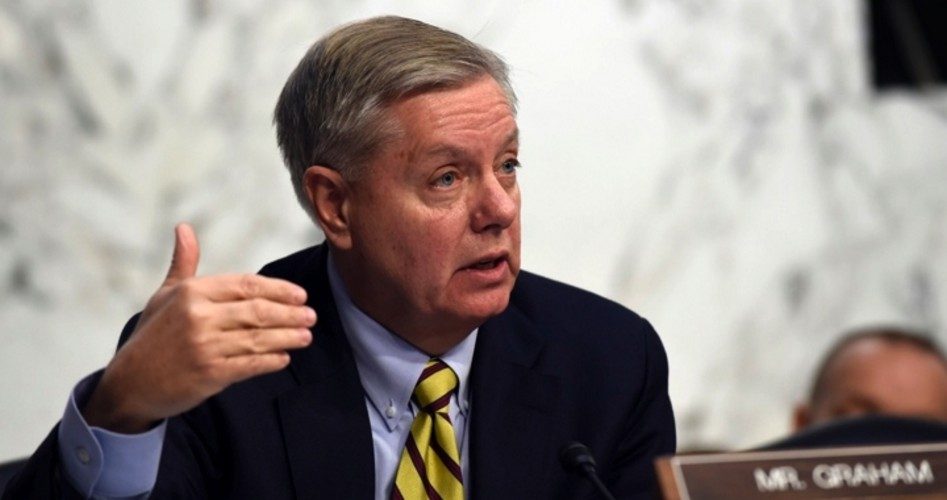
Senator Lindsey Graham (shown, R-S.C.) said if Republicans de-fund the Department of Homeland Security it would be the “worst thing to do” and would only “add gasoline to the fire.”
Graham made his comments while being interviewed by George Stephanopoulos on ABC’s This Week program on February 22. The senator was preceded on the program by Homeland Security Secretary Jeh Johnson, whom Stephanopoulos asked to comment on what might happen if funds for his department are not re-appropriated by Congress.
After discussing several other topics with Graham, from his quest for the 2016 Republican presidential nomination to former New York Mayor Rudy Giuliani’s recent statement questioning President Obama’s love for America, Stephanopoulos moved on to the subject of foreign policy and the threat to America from terrorists, especially ISIS.
Graham first advocated a heavily interventionist role for the United States in the Middle East — and blamed the failure of the United States to leave more troops in Iraq for the rise of ISIS. Following Stephanopoulos’s lead, he then straddled the fence and advocated support for both Judge Andrew S. Hanen’s recent order blocking the federal government from implementing the Obama administration’s amnesty-granting executive actions and also funding for the DHS.
Citing Johnson’s statement on the program just moments earlier that he was frustrated by the House and the Senate on the issue of DHS funding, Stephanopoulos asked Graham if he thought the standoff was going to get resolved. Graham replied:
Yes, it will. I agree with the Texas judge who said that the executive orders were illegal. I hope Republicans will come together and back the court case, file a friend of the court brief with the court and fund DHS. I am willing and ready to pass a DHS funding bill and let this play out in court.
The worst possible outcome for this nation is to defund the Department of Homeland Security given the multiple threats we face to our homeland. And I will not be part of that.
Stephanopoulos then asked the senator if he thought that he could get legislation funding DHS through the House. Though both chambers are now controlled by Republicans, the House has a track record of rejecting legislation passed by the Senate that conservative House members believe grants amnesty to illegal immigrants. Such was the case with the Border Security, Economic Opportunity, and Immigration Modernization Act of 2013 (S. 744), the widely publicized “Gang of Eight” immigration bill passed by the Senate in June 2013. Graham was one of the four Republicans of the bipartisan group who drafted the bill, along with Senators John McCain (Ariz.), Jeff Flake (Ariz.), and Marco Rubio (Fla.)
The Gang of Eight bill was never brought up for a vote in the House because many conservative representatives objected to it. Among the more outspoken representatives voicing their objections was Representative Lamar Smith (R-Texas), who was quoted by CNS News:
It’s hard to believe, but the Senate immigration bill is worse than we thought. Despite assurances, the border is not secured before almost everyone in the country illegally is given amnesty. The bill guarantees there will be a rush across the border to take advantage of massive amnesty.
Graham replied to Stephanopoulos’ question about the prospects of legislation funding DHS passing the House:
Time will tell. I hope my House colleagues will understand that our best bet is to challenge this in court, that if we don’t fund the Department of Homeland Security, we’ll get blamed as a party. And to anyone who is watching the world as it is, I’ve never seen more terrorist organizations with more safe havens, with more money, with more capability to strike the homeland than I do today. And that’s a direct result of a failed foreign policy by President Obama. And the worst thing to do is add gasoline to the fire by having the Republican Party defund the Department of Homeland Security.
While even the most strident noninterventionist would agree with Graham’s statement that the success of terrorist organizations is a “direct result of a failed foreign policy by President Obama” — at least with regard to ISIS — they would do so for greatly different reasons from those Graham offered in his interview. They would also not limit the blame to Obama, but extend it also to Obama’s predecessors, especially George W. Bush.
Graham offered this explanation for the rise of ISIS:
You know, ISIS [ISIL in the transcript] is a direct result of bad policy choices, not leaving troops behind in Iraq, not dealing with Syria three years ago … through a no-fly zone.
So at the end of the day, I want the Republican Party to talk openly about the hard things, like having boots on the ground in Syria and Iraq, American boots on the ground.
Graham asserted that ISIS was successful because we did not leave U.S. troops behind in Iraq, after almost 4,500 Americans had already been killed there between 2003 and 2011, with the culmination of the war that began under President Bush. The United States and a coalition of allies invaded Iraq and removed Saddam Hussein from power in 2003. Had he remained in power, it is highly unlikely that ISIS or similar terrorist groups would have succeeded in overrunning much of Iraq.
However, not satisfied with removing one dictatorial strongman who at least kept his nation somewhat stable and free from terrorists, our government decided to try again — in Syria this time. The Obama administration aided the rebel forces attempting to remove Syrian President Bashar al-Assad.
The ISIS militants we are now trying to subdue are allied with the rebel coalition fighting against the Assad regime in Syria — a coalition that has received U.S. support. President Obama expressed hope in a news conference in 2013 to “mobilize the international community to support” a regime change in Syria.
Senator Rand Paul (R-Ky.), who was obviously aware of the connection between the anti-Assad rebels and the al-Qaeda-linked organizations (such as ISIS), made a statement on May 21, 2013, directed at his colleagues, nearly all of whom voted to send arms to Syrian rebels: “This is an important moment. You will be funding, today, the allies of al-Qaeda.”
The Senate Foreign Relations Committee passed amendments to the Authorization for the Use of Military Force (AUMF), co-sponsored by John McCain and Chris Coons (D-Del.), on September 4, 2013. The McCain-Coons Amendment #2 included language stating: “A comprehensive U.S. strategy in Syria should aim, as part of a coordinated international effort, to degrade the capabilities of the Assad regime to use weapons of mass destruction while upgrading the lethal and non-lethal military capabilities of vetted elements of Syrian opposition forces, including the Free Syrian Army.”
McCain and Graham met with Obama at the White House on September 2, 2013 to discuss the president’s plans to give the Syrian rebels more advanced weapons. “[Obama] said that he was willing to upgrade the capabilities of the Free Syrian Army,” McCain said in an interview afterwards with The Daily Beast.
As one indication that Senator Paul’s warnings that sending aid to the Syrian rebels would result in funding the allies of al-Qaeda (which include ISIS) were valid, we read this report from Breitbart News last July 8:
Reports coming out of eastern Syria Monday revealed that several factions within the Syrian opposition force known as the Free Syrian Army (FSA) have pledged services to the Islamic State, the group formerly known as the Islamic State of Iraq and al-Sham (ISIS). Sources and eyewitnesses said that the FSA has handed over its weapons to the Islamic State in large numbers.
That U.S. intervention in the civil war in Syria would lead to greater chaos in the region and the strengthening of radical Islamic forces was an inevitable as the U.S. removal of Saddam Hussein in Iraq leading to the chaos and takeover of much of the country by ISIS.
Graham’s contention that a greater threat to American safety posed by terrorist organizations (principally ISIS) is “a direct result of a failed foreign policy by President Obama,” is just so much political posturing. Graham and his interventionist colleague Senator John McCain backed Obama’s aid to the Free Syrian Army (FSA) that benefited ISIS, allowing it to become a potent force in the region. Now both senators oppose the strategy favored by many of their GOP colleagues — holding up funding of DHS to counter the Obama amnesty — because they deem the DHS to be essential in defending American against ISIS, which very likely would not have become a threat to America without the U.S. aid diverted to it from the FSA!
As is usually the case, America’s enemies have been bought and paid for with U.S. dollars.
Democrats and Republicans may criticize each other in front of the cameras because that is what they are expected to do. But the insane interventionist foreign policy that has entangled our nation in conflict after conflict is as bipartisan as the “Gang of Eight” bill.
Related articles:
Cruz Says Obama Administration Is “Counterfeiting Immigration Documents”
Federal Judge Stops Obama Executive Action Amnesty
More States Suing Feds Over Immigration Executive Orders
States Sue Obama Administration Over Executive Order on Immigration
McConnell Says House Must Amend DHS Funding Bill
House Republicans Plan Strategy to Block Obama Executive Amnesty
House Members Introduce Bills to Undo Obama Amnesty Program
House Passes “Executive Amnesty Prevention Act of 2014”
House Members Introduce Bills to Undo Obama Amnesty Program


